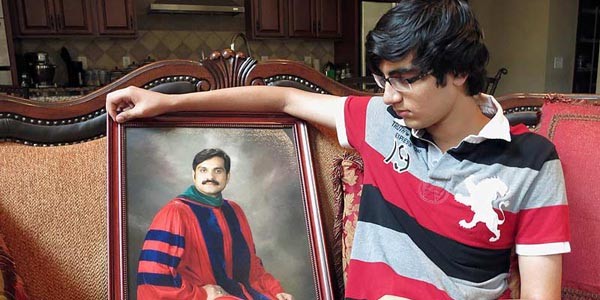

Farzana Parveen and Dr Mehdi Ali Qamar are names that you may not remember. But their lives represent stories that all of us would do well to commit to memory.
One was a woman who was beaten to death with bricks near the gates of the highest court in the province. The other was shot dead by religious fanatics in front of his wife and child as he exited a graveyard.
The ‘crime’ committed by the woman was that she married of her own choice. The unpardonable sin of the doctor was that he was an Ahmadi.
One was bludgeoned to death along with a child in her belly outside a court created by the constitution, the same constitution that also granted her fundamental rights. The other was excluded by the constitution. The words in the constitution stayed silent and lifeless -- as this country watched another series of brutal acts. And soon began the routine of forgetting them.
So what if these were both individuals with lives, hopes and dreams like you and me? So what if one of them had come to Pakistan to treat the less-privileged with his expertise as a cardiac surgeon? So what if she wanted to live her life the way she wanted and marry the man of her choice? Murder, of course, was and remains the most common solution in this country. The silence of the state and citizenry remains the only semblance of collective action.
We are united as a nation. We are united in the crimes that we oversee, allow, condone, encourage and then forget. We speak with one voice in forgetting brutalities against the vulnerable. What more could we want?
Farzana was allowed to die as she screamed for help. The lawyers, public and police that are always present outside the Lahore High Court did nothing to help her. Of course, since a woman was involved, it was the family’s ‘personal’ affair. But Dr Mehdi Ali Qamar’s faith was not personal -- what he believed in his heart was apparently so offensive that he had to be done away with.
This is not the first or the last time that I am discussing the murders or attempted murders during the week. A Shia doctor and his son, journalists, members of Hazara community, a human rights lawyer, a woman, an Ahmadi etc. This piece does not change anything. All it does is that it allows me to cleanse my mind and share the disgust.
You know, I never wanted to be a lawyer. But life takes unexpected turns and I became one. I live a truly privileged life. And each week I think of multiple issues regarding the law itself that I want to write about. And yet I never can since I am compelled to mourn lives lost or ideals attacked. To think that this is the rest of my life as a column writer is rather depressing. And quite frankly, this is the rest of my life as a column writer.
Pakistan is far too weak as a state to substantially change in the next two or three decades. The communities and the gender that we have marginalised are condemned to suffering -- a whisper of protest might bring solace, but no security.
Do not, for a second, believe that Pakistan turned into the land of bigotry in the last couple of decades. This state has always allowed and watched silently as notions of honour and religion have been used to kill and maim women and unpopular minorities such as Ahmadis.
Soon after independence, Ahmadis were maimed in Lahore and the state buckled down. Women have continued to be slaughtered in the name of ‘honour’ and the state has watched silently. Year after year, decade after decade, the state has failed to ensure the physical security of those who oppose bigotry and vigilantism. This was and remains a principal reason why these crimes continue to happen.
As long as the state does not take drastic steps to ensure physical security of the vulnerable and those who speak up in their favour, things will not change. But this change cannot occur overnight. If the state has buckled down for decades, it cannot suddenly rise up to correct the injustice -- even if it wants to. But that assumption, that the state wants things to change, in itself is a big one. There is an utter lack of political will to challenge the bigoted mindset.
So, while you condemn these injustices, be prepared to see more of these. Be prepared to see rivers of blood carrying the names of Farzana Parveen, her unborn child and Dr Mehdi Qamar.
Many of you who read this piece would have children, many of you reading this would have fallen in love and married the person of your choice. Some of you may even have used your expertise and training to help the less-privileged.
And if you have not done, then I pray that you fall in love and marry the person you choose. I pray that your children do the same and raise their own children with love. I pray that you can all use your expertise and travel to lands elsewhere to help those who can only pay for your services with gratitude.
None of these dreams, prayers or aspirations is a crime. Yet they are treated as unpardonable sins in today’s Pakistan. Farzana Parveen and Dr Qamar deserved the lives they wanted to live.
They paid for their dreams and aspirations for their lives. May we always remember them and honour the lives that they lived.